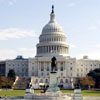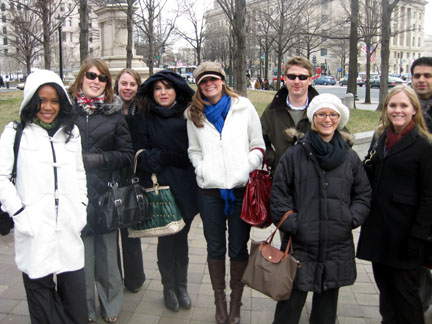SMU students cover Obama inauguration
SMU students who went to Washington, D.C., for the inauguration blogged about their experiences.

A group of SMU communications and journalism students went to Washington, D.C., where they had an up-close view of the Presidential Inauguration on Jan. 20, 2009.

The students blogged throughout their trip for various sites, including SMU Student Adventures, The Dallas Morning News, People Newspapers, and The SMU Daily Mustang, a news site produced by journalism students. (See below for list of links to their blogs.)
In addition to witnessing President-elect Barack Obama's swearing-in ceremony, the students' trip included:
- Volunteering at the Texas State Society's Black Tie & Boots Inaugural Ball
- Viewing a debate on energy and climate change between debate team powerhouses Michigan State and Wake Forest
- A visit to the Newseum, where they will hear "Inside Media: Presidential To Do’s," a speech from former presidential adviser Stephen Hess
- Visits to the nation's museums and monuments, including the Lincoln Memorial, where a concert will feature notables including Martin Luther King III and Beyonce
Kirk has been attending the Inauguration with students since 1992. Since 2000, students also have worked as volunteers at the Republican and Democratic National Conventions. She says the experiences give students an appreciation of the U.S. system of government.
"After a sometimes bitterly fought campaign, people join together to inaugurate the president," she says. "This peaceful transition of power is a hallmark of democracy."
Students also become aware of rhetorical power, she says. "They learn how the carefully planned, symbolic ceremonies - as well as the power of words - mold and shape our experiences," she says. "They examine the implications of the classical term 'memoria' – that is, what we are called to remember."
Related Links:
- Read the blogs
-
SMU Student Adventures
http://blog.smu.edu/StudentAdventures/inauguration_trip_2009/
-
Daily Mustang Inauguration Blog
http://www.smudailymustang.com/?cat=761
- dallasnews.com
-
Kaci Koviak - 'People are crying with joy'
http://trailblazersblog.dallasnews.com/archives/2009/01/dallas-snapshots-people-are-cr.html -
Lizzie Brubaker - Protesters (try to) speak out
http://trailblazersblog.dallasnews.com/archives/2009/01/dallas-snapshots-protesters-tr.html -
Caitlin Myers/Jia Thomas - SMU students shift gears as they hit inauguration crowds
http://trailblazersblog.dallasnews.com/archives/2009/01/dallas-snapshots-smu-students.html -
Rita Kirk - Conga lines in the streets
http://trailblazersblog.dallasnews.com/archives/2009/01/dallas-snapshots-conga-lines-i.html
-
Innovation in College Media
http://www.collegemediainnovation.org/blog/2009/01/19/student-media-covering-the-inauguration/
-
People Newspapers (Park Cities People)
http://blog.peoplenewspapers.com/2009/01/20/smu-inauguration-watch-party/
- See WB33 report on the students' trip.
# # #